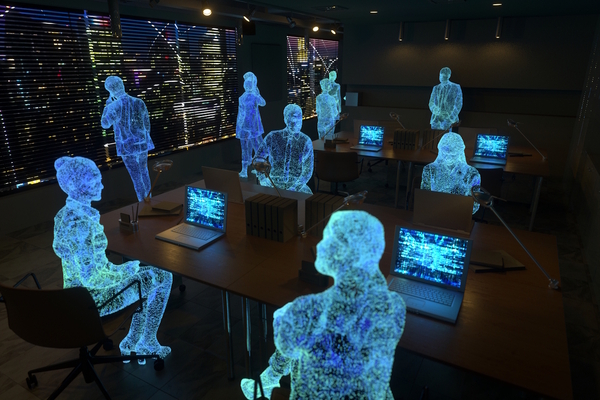Empowering organisations through AI democratisation

Gert-Jan Wijman at Celigo explores the power of citizen developers
Early AI deployments are yielding benefits for enterprise IT and operations professionals, such as increased productivity and efficiency, improved customer experience, and lower costs. With AI now seen as a crucial element for enhancing IT and operations processes, it’s essential that businesses have an organisation-wide strategy and deployment roadmap in place.
By aligning AI initiatives with business objectives and empowering cross-functional teams to use AI tools, businesses not only increase the effectiveness of their AI installations but empower team members outside of the IT function to safely use and benefit from the technology.
The concept of AI democratisation continues to gain traction. A recent research report from Celigo, found that 68% of IT/Ops leaders support a "citizen developer" mindset to automate front- and back-office operations. Furthermore, 53% of IT teams are allowing business users to implement AI solutions independently, reducing their reliance on IT support.
Additionally, by allowing them to implement AI solutions independently they are empowered to address specific operational challenges directly, leading to faster innovation and more tailored solutions. This indicates a foundational integration strategy is needed to establish the appropriate safeguards to enable citizen developers to deploy AI applications while maintaining proper IT governance.
A citizen developer mindset
As a quick aside, if you haven’t encountered the phrase "citizen developer" within your organisation, the term refers to a democratisation of technology that results in non-technical staff members utilising low-code or no-code platforms to create applications and automate processes within their companies. A citizen developer for example could be a finance manager at a retail company who wants to automate the process of reconciling daily sales data from multiple e-commerce platforms with the company’s accounting software.
Citizen developers are increasingly harnessing the power of AI and other tools to revolutionise operations. With the advent of user-friendly AI tools and platforms, these non-technical staff are building and deploying AI-driven solutions that streamline processes, enhance decision-making, and drive innovation.
Benefits of a citizen developers’ approach
There are numerous benefits to taking a citizen developer approach. The first benefit is perhaps the most obvious; time efficiency.
Citizen developers frequently use AI to automate tasks that have historically been seen as repetitive and time-consuming and which cause inefficient workflows. AI users can automate various tasks– for example, customer service interactions, data entry, and inventory management. Such automation not only increases productivity but also reduces the potential for human error, equalling more reliable and consistent operations.
AI also provides greater access to the advanced data analytics projects, previously passed to data experts to support decision making. By harnessing such AI tools, functions outside of IT can begin to analyse large data sets themselves, uncovering insights and trends so they can reduce their reliance on other business functions.
A culture of innovation and learning
Innovation is an area where Gen AI, specifically, excels; its use is empowering non-technical staff to experiment and be creative in ways they couldn’t before. Through AI, citizen developers can rapidly prototype and test new ideas, leading to the swifter development of solutions tailored to their specific business needs. Breaking down barriers to innovation enables a business to tap into a wider range of ideas and perspectives while accelerating digital transformation and supporting organisations to stay competitive in their evolving market.
By fostering a culture where anyone can contribute to technological advancement, businesses begin to unlock fresh opportunities to drive growth, the potential of which is extremely exciting for the wider economy.
Bridging the IT gap safely
An emphasis on ongoing education and skill development is essential if citizen developers are to be successful and the IT gap is to be bridged through democratisation. While the whole point of a citizen developer is that they don’t need the technical know-how of an IT professional, businesses still need to invest in training courses to provide basic guidance and knowledge of AI products.
More than this, internal regulation is essential. While the benefit of democratisation is clear, so too is the potential for damage should a proper safeguarding strategy not be put in place.
Having a strategy that encourages collaboration between business and IT departments shines a light on both technical limitations of teams and the opportunities available.
We’ve talked about the benefits IT teams get from having a lighter workload, but we haven’t pointed out what it offers in terms of business teams learning more about the IT function and the limitations and opportunities that are a common part of the development process. Working closer together, both teams will gain a better understanding of the other, which facilitates the faster development of solutions better linked with the wider objectives of the organisation. Citizen developers ultimately have better business context leading to improved business outcomes.
This democratisation of technology encourages a broader segment of the workforce to contribute to digital transformation efforts, fostering a culture of continuous improvement and agility. In turn, this can lead to increased competitiveness, making the business better equipped to respond to changing market demands and technological advancements.
By bridging the IT gap through AI democratisation, non-technical staff feel empowered, organisations see greater efficiencies, innovation is boosted, and any new technology solutions developed that are better suited to the changing demands of the entire organisation.
Gert-Jan Wijman is Vice President and General Manager Europe, Middle East and Africa at Celigo
Main image courtesy of iStockPhoto.com and BrianAJackson

Business Reporter Team
Related Articles
Most Viewed
Winston House, 3rd Floor, Units 306-309, 2-4 Dollis Park, London, N3 1HF
23-29 Hendon Lane, London, N3 1RT
020 8349 4363
© 2025, Lyonsdown Limited. Business Reporter® is a registered trademark of Lyonsdown Ltd. VAT registration number: 830519543





